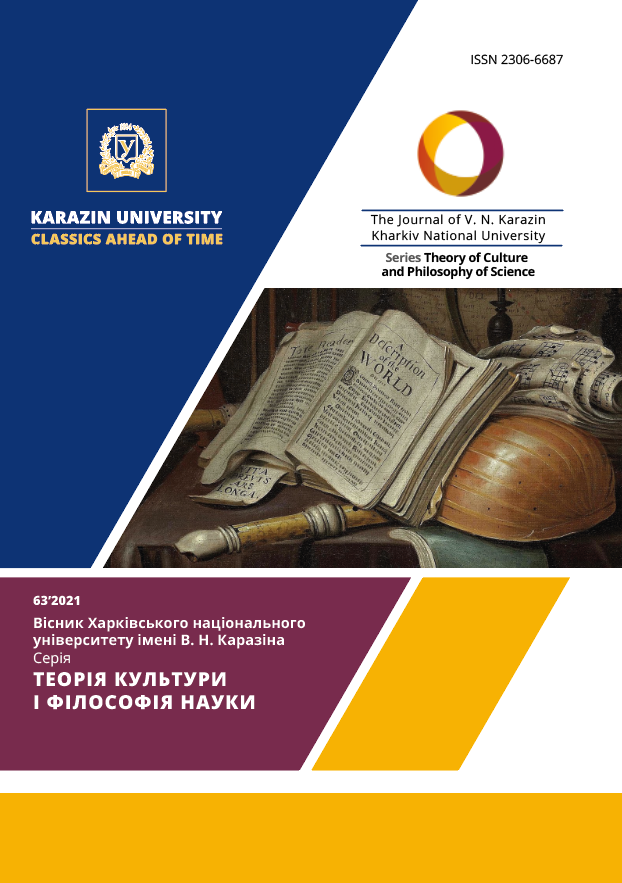ФІЛОСОФСЬКИЙ АНАЛІЗ ПРОЦЕСУ СОЦІАЛІЗАЦІЇ В СОЦІАЛЬНИХ МЕРЕЖАХ КИТАЮ
Анотація
Умови життя в інформаційному суспільстві вносять свої корективи в такий характерний для «реального життя» процес, як соціалізація. У соціальних мережах сформувалися умови для появи «гібридної соціалізації». Вона відрізняється від процесу соціалізації в звичайних умовах життя людини і привносить свої особливості і в цей процес, і в саму соціалізацію. Якщо ж говорити про підлітків, то їх соціалізація формується скоріше в світі віртуальному, ніж в реальному. Вплив віртуального світу можна визначити, як багатогранний, а сам віртуальний світ (інтернет-простір і соціальні мережі) створює умови для реалізації різних форм соціалізації. «Гібридна соціалізація» привнесла безліч неминучих проблем: популярність інтернету послаблює традиційні авторитети в області соціалізації; випуск і поширення мережевої інформації контролюється кількома розвинутими країнами, загальнолюдські цінності піддаються «перегляду». У віртуальному світі феномен ресентімента став поширеним явищем і активно проявляється у вигляді заздрості, відвертого бажання образити співрозмовників, образити зовсім незнайомих користувачів мережі у вигляді частих проявів агресії, некоректної поведінкию тощо. Ці процеси підривають традиційну мораль і в той же час сприяють формування соціалізації в умовах онлайн. Такі механізми соціалізації, як імітація, примірка ролей, тощо почали «ламатися» і «відхилятися» від своїх класичних стандартів. Мережа перериває кордони між віками: молоде покоління починає контактувати з дорослим світом в нових умовах і з новими темпами, стаючи «дорослою дитиною» набагато раніше за свій реальний вік. Відеоінформація, широко поширена в інтернеті, переповнена такими феноменами, як «виставляння себе напоказ», постійним порівнянням з боку людини із «зірками Інтернету», «поклоніння грошам», що серйозно вплинуло на традиційні моральні концепції і цінності і поставило під загрозу традиційні людські стандарти життя.
Завантаження
Посилання
Bell, D. (1973). The Coming Of Post-Industrial Society:A venture in social forecasting, New York.
Castells, M. (2006). The rise of the network society (Xia, Z. J., Trans.), Beijing: Social sciences academic press. (Original work published 1998).
McLuhan, M. (2000). Understanding Media: The Extensions of Man (He, D. K., Trans.), Beijing: Commercial press. (Original work published 1964).
Sun, W. P. (2010). Information society and its basic characteristics. Philosophical Trends (09), 12-18.
Socialization, (2021). Retrieved from: https://www.dictionary.com/ browse/socialization
Liu, Y. M. (2018).Multifaceted changes in Network Society. Century Bridge (05), pp. 65-67.
Jiang, R. Y. (2009).Network society and human socialization. Journal of Hebei University of Engineering (SOCIAL SCIENCE EDITION) (02), 75-76.
Wu, L. J. (2020).The realistic path of internet democratic value. Journal of Shanxi Datong University (SOCIAL SCIENCE EDITION) (05), 27-30.
Qu, H. J. (2010).Elimination of elite forces in public sphere by networking. Success (Education) (05), 250-251.
Feng, X. T. (1999). Virtual socialization and the crisis of youth’s role identity. Youth Studies (12),15-19.
Wang, W. (1999). The transformation of youth socialization paradigm in the network age. Youth Studies (12),10-14.
Xu, R. P. (2005). On the influence of cyberspace on Teenagers’ socialization. Seeking (02), 76-78+21.
Ritzer, G. (2019). The McDonaldization of society into the digital age. Sage publications.
Liang, C. H. (2006). Network language--the reflection of social psychology in the network age. Journal of Guangxi Medical University (Social sciences edition) (S1), 371-373.
Frank, K. (1998). The revolution of Media, Shanghai: Shanghai translating press.
John, D. P. (1988). The theory of socialization, Beijing: Beijing international culture press.
Yao, W. (2020). An overview of the new development of Contemporary Western Sociological Theory. Theory Monthly (08), 77-85.
Parsons, T. (2003). Structure of social action, Beijing: Yilin Translation Publishing House.
Marx, K., Engels, F. (1972). Selected works of Max and Engels, Beijing: Beijing people’s press.
Cao, X. Y. (2021).Don't let internet addiction control you. Study (21), 67-68.
Sonstein, K., 2003. Network Republic (Huang, W. M., trans), Shanghai: Shanghai People’s Publishing House.
Toffler, A., (2006). The third wave (Huang, M. J., trans), Beijng: China Citic Press.
Liao, L. H. (2001).Effect of network on youth socialization and Its Countermeasures. Journal of Shanghai University (SOCIAL SCIENCES EDITION) (06), 85-90.
Nietzsche, F. (2003). On the genealogy of morality. Beijing: China University of political science and Law Press.
Sheler, M. (1997). Vom Umsturz der Werte (Luo, D. L., Lin, K., and Cao, W. D., trans), Beijing: Joint Publishing.
Tao, P. (2015). Network Resentment: obstruction and resolution of order construction in virtual public sphere. Journal of Beijing University of Posts and Telecommunications (SOCIAL SCIENCE EDITION) (04), 10-14+49.
Yu, H., Wang, Q. (2015). Social resentment and media construction, Journal of Huazhong University of science and Technology (SOCIAL SCIENCE EDITION) (03),125-130.
Swaan, A. (2015). The Killing Compartments: The Mentality of Mass Murder, Yale University Press.
Yan, J. Q. (2020).Analysis and Reflection on moral problems in the network era. Education informatization forum (03), 62-63.
Wang, Y. (2010). New media technology, new media environment and youth socialization. Journal of Xiangtan University (PHILOSOPHY AND SOCIAL SCIENCES EDITION) (01), 91-94+98.
Cheng, Z. H. (2015). Children's nature and children’s education. Academic circle (06), 121-130+325.
Wang, X. Y. (2021). On the phenomenon of “children’s adulthood” in the new media environment. Southeast communication (03), 119-124.
Lasswell, H. (1984). The Structure and Function of Communication in Society(Huang, L., trans), Beijing: People's daily press.
WeChat, 2021. https://new.qq.com/omn/20210120/20210120A00ZQ700.html
Xu, S. S. (2015).The influence of mass media on human socialization. Science and technology communication (07), 183+108. doi:10.16607/j.
Mao, Y. H. (2017). Negative effects of social media on interpersonal communication from WeChat circle of friends. News Research Guide (18), 105+149.
Jiang, J. G. (2016). Generalization of WeChat circle of friends: Communication fatigue and emotional alienation. Modern communication (Journal of Communication University of China) (08), 67-71.
Dong, C. (2021). Research on “group loneliness” under virtual social networking. Legal system and society (05), 119-120.
Chen, X. F. (2018).The reason and development of short video Tik Tok APP -- Taking “Tik Tok” as an example. Audio and visual (11), 136-137.
Fan, H. C. (2021). False communication, lack of meaning and value confusion. Modern audio and visual (05), 8-12.
Li, L. L. (2020). Negative effects of short video on teenagers and Countermeasures. Journal of the Party
School of Yunnan Province (03), 133-138.




